What are uterine fibroids?
Fibroids are benign tumors that can grow in the uterus. These balls of fibrous tissue develop when a single cell of the muscle of the uterus goes awry and clones itself multiple times. Women can develop one or multiple fibroids that can grow into the uterine cavity, on the uterine wall, and just under the outside of the uterus, according to the U.S. Department of Health and Human Services. Some fibroids remain tiny, while others can grow to the size of a grapefruit or watermelon. Fibroid symptoms can be similar to those of other conditions that affect women’s reproductive organs—if symptoms are present at all. If you notice any of the following signs, physicians recommend requesting an appointment to determine if fibroids could be the cause.
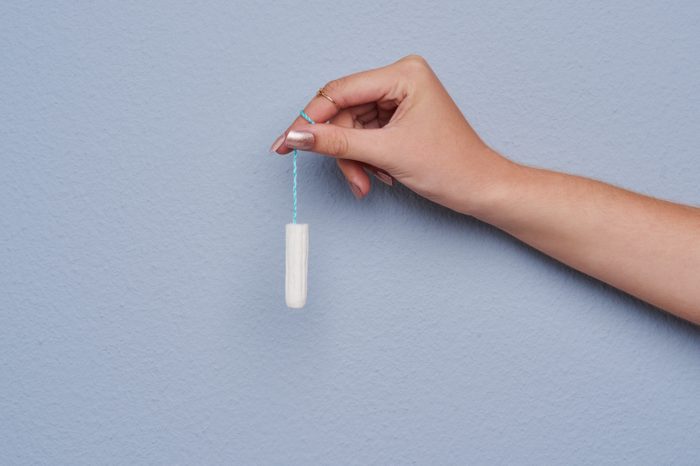
Excessive menstrual bleeding
The most common fibroid symptoms include heavier than normal menstruation that lasts longer than usual, typically seven days or more. Serdar Bulun, MD, chair of the department of obstetrics and gynecology at the Feinberg School of Medicine at Northwestern University and obstetrician-gynecologist-in-chief at Prentice Women’s Hospital-Northwestern Memorial Hospital says this excess uterine bleeding is determined by how heavy bleeding is each day of menstruation and how long menses lasts. “The typical woman with a fibroid uterus may have major flow during her menses for more than four or five days and go through excessive numbers of tampons or pads,” says Dr. Bulun. While fibroids can grow anywhere in the uterus, those that grow closer to the uterine cavity are believed to cause heavier menstruation. “The uterine cavity is lined with tissue you shed every month for a normal menstrual period. When that fibroid grows either right next to it or indents the cavity, it likely increases the amount of tissue that you’re going to have to shed,” says Shannon Laughlin-Tommaso, MD, consultant and assistant professor at Mayo Clinic in Minnesota.
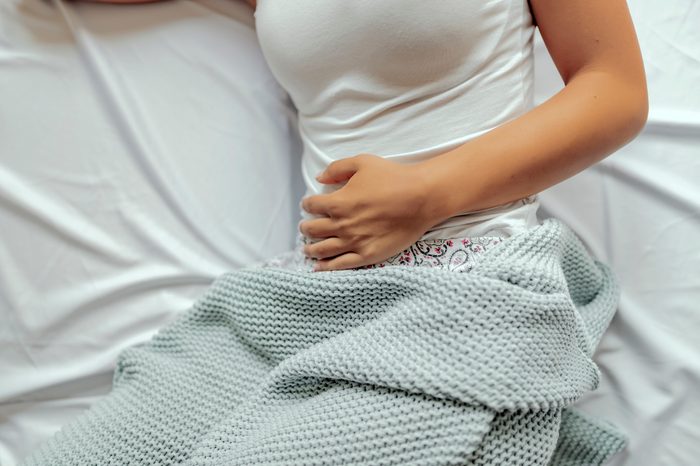
Stabbing pain at various times throughout the month
Although it’s rare, some women experience burning or stabbing pain associated with fibroids. When fibroids outgrow their blood supply it can cause heart attack-like pain in the uterus or in the area where the fibroid is located in the uterus. “They’re hormonally responsive so those pains might be only certain times of the month like right before the period starts when the hormone levels are the lowest,” says Michelle Luthringshausen, SACOG, MD, director of robotics at Northwest Community Healthcare in Arlington Heights and assistant professor of obstetrics and gynecology at the Feinberg School of Medicine at Northwestern University.

Bleeding between periods
Bleeding between periods could be caused by the presence of fibroids, says Charles Miller, MD, who has a private practice in metropolitan Chicago where he specializes in the treatment of infertile couples and minimally invasive gynecologic surgery. “As those fibroids do get closer to the [endometrial] canal, however, they can enter the canal and be associated not only with heavy bleeding with periods, but even bleeding between periods,” says Dr. Miller. Don’t miss these other period problems you shouldn’t ignore.

Pelvic pain and pressure
If fibroids grow larger in the muscle of the uterus or outside the uterus, fibroid symptoms can include pelvic pain, painful menses, or pain during sex, says Dr. Miller. These fibroids can grow quite large and press on other organs, causing women to feel pressure for some time before fibroids are detected. Dr. Laughlin-Tommaso says patients mention a feeling of heaviness in the pelvis or feeling a mass in the area when fibroids are present. “Sometimes people can look pregnant or they can feel their fibroid through their abdominal wall,” Dr. Laughlin-Tommaso says.

Increased urinary frequency
If the fibroid is pressing against the bladder it can cause an increased frequency in urination. Women who find they get up in the middle of the night to urinate, frequently urinate only small amounts, or have difficulty initiating urination could have fibroids. Fibroids can also add pressure to the ureters, the tubes that carry urine from the bladder to the kidneys, and cause a condition called hydronephrosis. “When they’re [fibroids] quite large they can put pressure on the tubes that take the urine from the kidney to the bladder and they actually cause the kidney to enlarge,” says Dr. Miller. (Find out the myths gynecologists want you to ignore.)
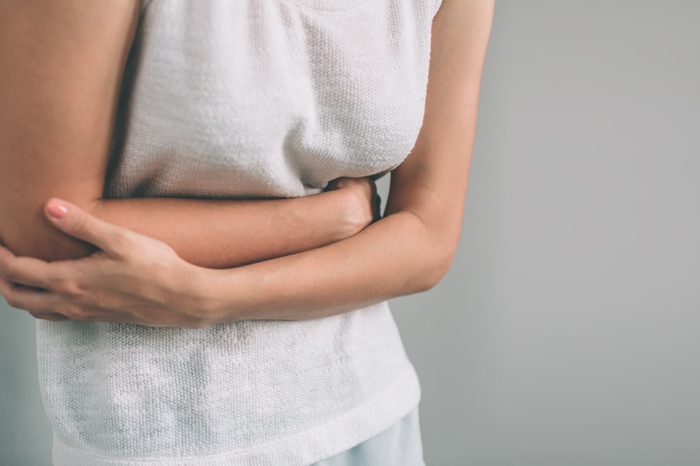
Difficulty with digestion
If fibroids grow very large, Dr. Laughlin-Tommaso says women can develop bowel compression, which leads to trouble with bowel movements. Women who have fibroids can experience constipation or bloating as well.
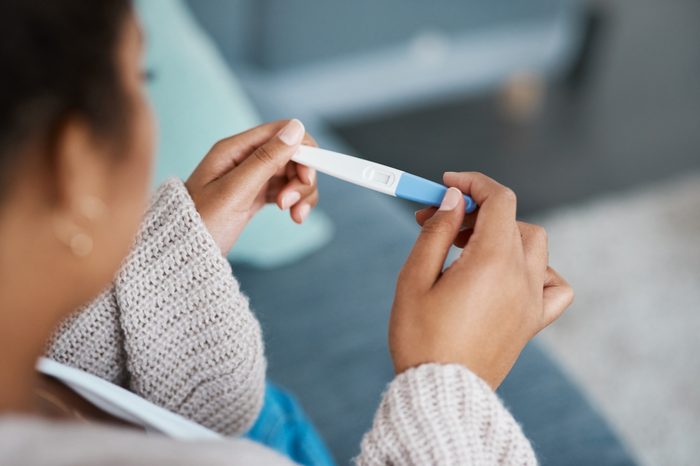
Possible infertility or increased risk of miscarriage
Difficulty getting pregnant could be one of the fibroid symptoms to pay attention to, especially if the fibroid is located in the endometrium (the inside lining of the uterus), where the baby grows, says Dr. Miller. Fibroids that grow inside the uterine cavity can lead to miscarriages and lower rates of conceiving. Dr. Laughlin-Tommaso says women who have difficulty with fertility may be advised to have fibroids located in the cavity removed. These are signs of infertility every couple should know.

Anemia
Anemia, a deficiency of red blood cells can occur in women that have fibroids due to the amount of blood lost during their menstruation. “In a significant number of patients the amount of bleeding would be so much that it would cause anemia,” says Dr. Bulun. (Here are the anemia symptoms you shouldn’t ignore.)
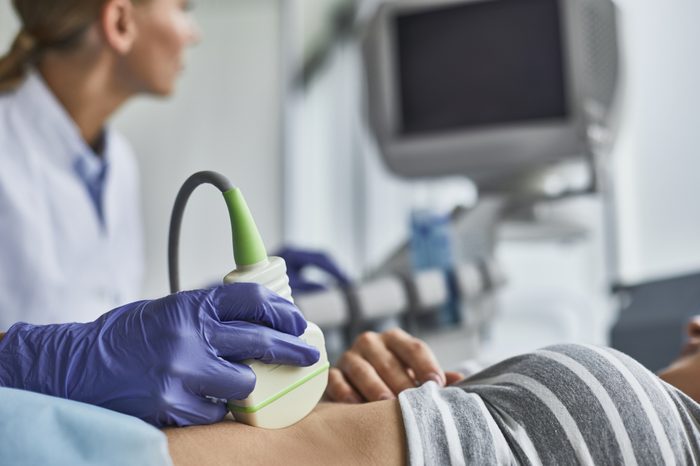
How to treat fibroids
Dr. Laughlin-Tommaso says uterine fibroid treatment varies depending on fibroid symptoms. Those who are asymptomatic might not need treatment at all. If women exhibit symptoms, particularly anemia or hydronephrosis, patients might need to consider treatment. Doctors say it’s important to ask women about their plans to become pregnant in the future before deciding on which course of action to take. “If you do want to retain fertility then we want to think about removing the fibroids or shrinking the fibroids without affecting the whole uterus,” says Dr. Laughlin-Tommaso. Fibroids can be removed through a surgical procedure called a myomectomy, the standard treatment for women looking to become pregnant in the future. Doctors use MR-guided focused ultrasound, uterine artery embolization, which blocks blood supply to the fibroid so that it degenerates, or laparoscopic ablation of fibroids to shrink tumors, but not completely eliminate them. Medical treatments include taking progesterone and estrogen filled birth control pills continuously or utilizing progesterone alone in the form of pills or an IUD. If women have completed their childbearing with no plans to conceive in the future, a hysterectomy is an option. (Here are myths about hysterectomy all women should know.)